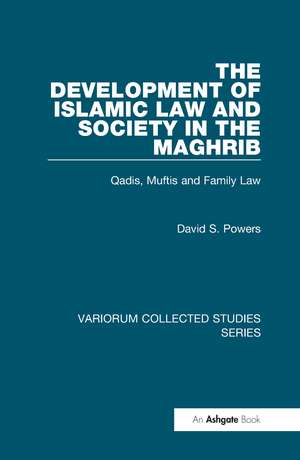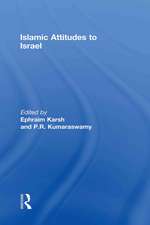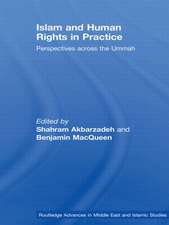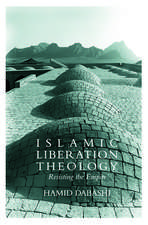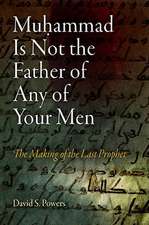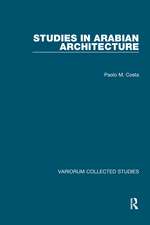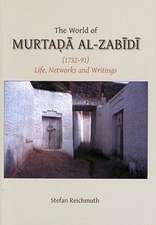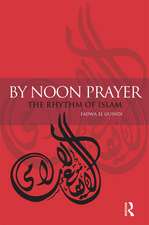The Development of Islamic Law and Society in the Maghrib: Qadis, Muftis and Family Law: Variorum Collected Studies
Autor David S. Powersen Limba Engleză Hardback – 28 oct 2011
Din seria Variorum Collected Studies
-
 Preț: 311.18 lei
Preț: 311.18 lei -
 Preț: 310.55 lei
Preț: 310.55 lei -
 Preț: 299.55 lei
Preț: 299.55 lei - 9%
 Preț: 1041.23 lei
Preț: 1041.23 lei -
 Preț: 386.77 lei
Preț: 386.77 lei -
 Preț: 351.48 lei
Preț: 351.48 lei -
 Preț: 313.38 lei
Preț: 313.38 lei -
 Preț: 386.77 lei
Preț: 386.77 lei -
 Preț: 310.22 lei
Preț: 310.22 lei -
 Preț: 258.66 lei
Preț: 258.66 lei -
 Preț: 343.33 lei
Preț: 343.33 lei - 9%
 Preț: 938.44 lei
Preț: 938.44 lei -
 Preț: 311.41 lei
Preț: 311.41 lei - 9%
 Preț: 938.85 lei
Preț: 938.85 lei -
 Preț: 312.75 lei
Preț: 312.75 lei - 9%
 Preț: 936.60 lei
Preț: 936.60 lei -
 Preț: 341.55 lei
Preț: 341.55 lei -
 Preț: 320.00 lei
Preț: 320.00 lei - 34%
 Preț: 764.20 lei
Preț: 764.20 lei - 22%
 Preț: 312.43 lei
Preț: 312.43 lei - 34%
 Preț: 739.65 lei
Preț: 739.65 lei - 34%
 Preț: 764.20 lei
Preț: 764.20 lei - 34%
 Preț: 680.73 lei
Preț: 680.73 lei - 26%
 Preț: 247.40 lei
Preț: 247.40 lei - 34%
 Preț: 485.78 lei
Preț: 485.78 lei - 34%
 Preț: 764.20 lei
Preț: 764.20 lei - 34%
 Preț: 769.51 lei
Preț: 769.51 lei - 34%
 Preț: 764.20 lei
Preț: 764.20 lei - 34%
 Preț: 826.68 lei
Preț: 826.68 lei - 25%
 Preț: 222.32 lei
Preț: 222.32 lei - 25%
 Preț: 225.54 lei
Preț: 225.54 lei - 34%
 Preț: 767.07 lei
Preț: 767.07 lei - 34%
 Preț: 764.20 lei
Preț: 764.20 lei - 34%
 Preț: 736.38 lei
Preț: 736.38 lei - 34%
 Preț: 738.42 lei
Preț: 738.42 lei - 25%
 Preț: 226.52 lei
Preț: 226.52 lei - 33%
 Preț: 491.66 lei
Preț: 491.66 lei - 34%
 Preț: 485.78 lei
Preț: 485.78 lei - 34%
 Preț: 485.78 lei
Preț: 485.78 lei - 34%
 Preț: 764.20 lei
Preț: 764.20 lei - 34%
 Preț: 736.38 lei
Preț: 736.38 lei - 31%
 Preț: 473.94 lei
Preț: 473.94 lei - 18%
 Preț: 807.71 lei
Preț: 807.71 lei - 34%
 Preț: 764.20 lei
Preț: 764.20 lei - 34%
 Preț: 764.20 lei
Preț: 764.20 lei - 34%
 Preț: 764.20 lei
Preț: 764.20 lei - 51%
 Preț: 485.78 lei
Preț: 485.78 lei - 34%
 Preț: 485.78 lei
Preț: 485.78 lei - 34%
 Preț: 769.10 lei
Preț: 769.10 lei - 34%
 Preț: 766.65 lei
Preț: 766.65 lei
Preț: 825.21 lei
Preț vechi: 1242.48 lei
-34% Nou
Puncte Express: 1238
Preț estimativ în valută:
157.93€ • 163.62$ • 131.80£
157.93€ • 163.62$ • 131.80£
Carte tipărită la comandă
Livrare economică 22 martie-05 aprilie
Preluare comenzi: 021 569.72.76
Specificații
ISBN-13: 9781409403708
ISBN-10: 140940370X
Pagini: 356
Dimensiuni: 150 x 224 mm
Greutate: 0.75 kg
Ediția:1
Editura: Taylor & Francis
Colecția Routledge
Seria Variorum Collected Studies
Locul publicării:Oxford, United Kingdom
ISBN-10: 140940370X
Pagini: 356
Dimensiuni: 150 x 224 mm
Greutate: 0.75 kg
Ediția:1
Editura: Taylor & Francis
Colecția Routledge
Seria Variorum Collected Studies
Locul publicării:Oxford, United Kingdom
Cuprins
Contents: Introduction; Part 1 Qadis, Muftis and Courts: Legal consultation (futya) in medieval Spain and North Africa; On judicial review in Islamic law; Parents and their minor children: familial politics in the middle Maghrib in the 8th/14th century; From the Mi`yar of al-Wansharisi to the New Mi`yar of al-Wazzani: continuity and change (with Etty Terem). Part 2 Women and Divorce: Women and divorce in the Islamic West: three cases; Four cases relating to women and divorce in al-Andalus and the Maghrib, 1100-1500. Part 3 Inheritance: The Islamic inheritance system: a socio-historical approach; Law and custom in the Maghrib, 1475-1500: on the disinheritance of women. Part 4 Endowments: The Maliki family endowment: legal norms and social practices; A court case from 14th-century North Africa; Fatwas as sources for legal and social history: a dispute over endowment revenues from 14th-century Fez; Orientalism, colonialism, and legal history: the attack on Muslim family endowments in Algeria and India; Index.
Notă biografică
David S. Powers is Professor of Islamic History and Law at Cornell University, USA.
Recenzii
'David Powers is an outstanding scholar of classical Islamic law and legal system. His research focuses on the history of Islamic law and its application in Muslim societies. He has published intensively in this area and here he places in the hands of the readers two decades’ work on the nature and performance of key Islamic legal institutions in the medieval Islamic West... this volume adds significant new details on Islamic legal and socio-cultural history, thus enhancing our understanding of both substantial and methodological aspects of the Islamic legal system and its general development, particularly in western Islam. Thus, this important work can be appreciated by students of Islamic law, Middle East scholars, and even the general public.' Bustan: The Middle East Book Review 'Each case study is in itself interesting and significant, but Powers' arguments are strengthened when the essays are read together ... anyone interested in Islamic legal development, comparative legal studies, the intersection of legal and social history, or women, family, and property in the western Islamic Mediterranean will want to read the essays collected here, and read them together.' Al-Masaq
Descriere
The first eleven essays in this collection analyze the application of Islamic law in family law cases in Qadi courts in the Maghrib between 1100 and 1500 CE. Based on preserved legal documents and the expert opinions of Muslim jurists (Muftis), they demonstrate that the jurists placed high value on reasoned thought and were sensitive to the manner in which law, society, and culture interacted. The final essay shows how the treatment of family endowments by colonial regimes in Algeria and India at the end of the 19th and beginning of the 20th centuries shaped, or misshaped, the modern western scholarly understanding of Islamic law.
